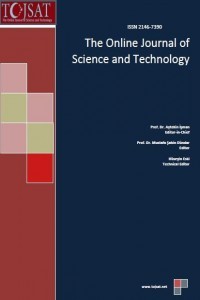Pre-Service Teachers' about the Use of Web Adventure in the Course of Introduction to Computer
Pre-Service Teachers' about the Use of Web Adventure in the Course of Introduction to Computer
web adevnture pre-service teacher, mathematics teaching,
___
- Akçay, A. & Şahin, A. (2009). Webquest and Usability of Turkish Language. International Congress of Educational Research, Çanakkale/Turkey. Web: http://oc.eab.org.tr/egtconf/pdfkitap/pdf/79.pdf
- Akçay, A. (2009). Impact of WebQuest Learning Environment on Academic Achievement and Attitudes of Students. Unpublished Master thesis, Atatürk University, Erzurum.
- Crawford, C. M. & Brown, E. (2002). Focusing Upon Higher Order Skills: WebQuest and The Learner Centered Mathematical Learning Environment. Web: http://www.eric.ed.gov/PDFS/ED474086.pdf
- Dodge, B. (1997). Some Thoughts About WebQuests. Web: http://webquest.sdsu.edu/about_webquests.html Dodge, B. (2001). FOCUS: Five Rules for Writing a Great WebQuest. Web: http://babylon.k12.ny.us/usconstitution/focus-5%20rules.pdf
- Halat, E. (2007). Views of pre-service elementary teachers on the use of webquest in mathematics teaching . İlköğretim Online, 6(2).
- Halat, E & Jakubowski, E. (2001). Teaching geometry using WebQuest. International Conference on Technology and Education, Florida/USA. Web: http://www.icte.org/T01_Library/T01_227.pdf
- Hassanien, H. (2006). An evaluation of the webquest as a computer-based learning tool. PostCompulsory Education, 11(2).
- March, T. (2003). What webquest are (really). Web: http://bestwebquests.com/what_webquests_are.asp
- Marzano, R. J. (1992). A different kind of classroom: Teaching with dimensions of learning. Web: http://www.eric.ed.gov/PDFS/ED350086.pdf
- Öksüz, C. & Uça, S. (2010). Using Webquest Elementary School Mathematics Lessons: A Video Case Study . E-Journal of New World Sciences Academy, 5(4).
- Polly, D. & Ausband, L. (2009). Developing Higher-Order Thinking Skills through WebQuests. Journal of Computing in Teacher Education,, 26(1).
- Summerville, J. (2000). WebQuests An Aspect of Technology Integration for Training Preservice Teachers. TechTrends, 44(2).
- Yıldırım, A. & Şimşek, H. (2008). Qualitative Research Methods in Social Sciences (6.Edition). Ankara: Seçkin Pub.
- Zheng, R. Stucky, B. McAlack, M. Menchana M. ve Stoddart S. (2005). WebQuest Learning as Perceived by Higher-Education Learners. TechTrends, 49(4).
- ISSN: 2146-7390
- Başlangıç: 2011
- Yayıncı: The association of science, education and technology
Pre-Service Teachers' about the Use of Web Adventure in the Course of Introduction to Computer
Online Tracking Nutrition and Health of High School Students
The Effects of Nature Education Project on the Environmental Sensitivity
Naim UZUN, Özgül KELEŞ, Funda Varnacı UZUN
An Agent Based Approach for Project Management in Construction
Distribution of salinity and nutrients in soils under recently environment change
Taha EL-MAGHRABY, Mohamed ABDEL-WAHAB
Chemical analysis to identify organic compounds in pre-Columbian monumental earthen architecture
Yuko KİTA, Annick DANEELS, Alfonso Romo De VİVAR
The role of using Facebook in improving English
Value of Blended Learning in Supporting Leadership Development Programs
Students understanding of the concept of limit of a function in vocational high school mathematic
